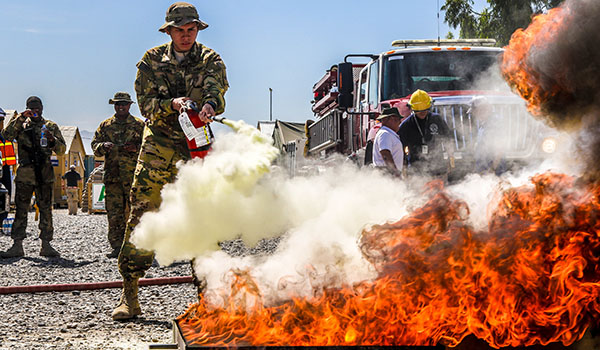
By CPT Roxana M. Thompson: Petroleum supply specialists are trained to receive, store and ship petroleum in large quantities safely and securely to ensure that all military aircraft are properly fueled to accomplish operations. However, the work of these Soldiers can be dangerous given that petroleum is a highly flammable substance and handling it requires detailed procedures and training. If not properly trained, the mishandling of petroleum can lead to fires causing serious damage to aircraft in an aviation unit and result in severe injuries or can even cause the death of a Soldier, to include pilots, if not extinguished immediately.

Task Force Heavy Cav Soldier PFC Victor Miranda Aranda extinguishes a fire during training with the FOB Fenty Fire Department in Afghanistan, which teaches Soldiers the basic skills of fighting fires when or if a fire emergency occurs. / ALL PHOTOS: U.S. ARMY PHOTOS BY CPT ROXANA THOMPSON
To prevent fires from occurring during refueling operations, petroleum supply specialists (MOS 92F) assigned with Echo Troop, Task Force Heavy Cav, Combat Aviation Brigade, 1st Armored Division teamed up with the Fenty Fire Department based in Afghanistan on May 5th to conduct training to learn all the techniques needed to extinguish a fire should it occur.
“The importance of our training makes everyone feel more confident if they had to fight a fire with the extinguishers they’ve got,” said John Crimean, Assistant Fire Chief of Operations. For petroleum supply specialists who work daily in refueling operations for various types of military aircraft, a fire extinguisher is often times the first line of defense in the event of an emergency.
Petroleum supply operations are an essential part of keeping aircraft ready for any mission, such as transporting troops, equipment and supplies in support of our Afghan and coalition partners for Operations Freedom’s Sentinel and Resolute Support. Safe handling of petroleum to prevent a fire is vital to ensure mission success and operational readiness.
“Being a 92F, we deal with the aircraft every day, pulling fire guard and refueling the aircraft. Soldiers having hands on training with a real fuel fire will show them what they are capable of dealing with if the situation occurs during operations,” said SSG Navnil Mishra, Petroleum, Oil and Lubricants (POL) Noncommissioned Officer in Charge, Task Force Heavy Cav and a native of the Fiji islands.
Soldiers learning fire prevention training and techniques for military operations can also use those skills to fight fires regardless of the situation. PFC Victor Miranda Aranda, a native of Monterey, Mexico and SPC Cesar Gonzalez of San Diego, CA, know personally how their hands-on fire prevention training can be vital both in the military and civilian world.
“SPC Gonzalez volunteered in California as a firefighter, and he inspired me to do more for the community,” said Aranda. Both Soldiers are active volunteers with the Doña Ana County Fire Department in Chaparral, New Mexico back in the U.S.
Volunteering with the Doña Ana County Fire Department allowed them to learn the basic skills of extinguishing fires “pull, aim, squeeze and sweep will help you with any fire emergencies,” added Cesar. The training served as an important way to increase the Iron Eagles’ operational readiness while deployed to Afghanistan allowing crews to fly safely and execute aviation missions across the Combined Joint Operations Area-Afghanistan. Because of this training, the unit’s petroleum supply specialists are now better trained, prepared and ready to extinguish hazardous fires.
CPT Roxana Thompson is the public affairs officer for Task Force Iron Eagles, Combat Aviation Brigade, 1st Armored Division.






